The following video was shared with me recently. I think that it is GREAT. It’s all about making a difference. We often don’t realize that we make a difference. I’ll let the video speak for itself.
Category: Thoughts (Page 11 of 19)
Everyone wants something for free. But what really is free? In terms of web sites, information and more on the internet, free seems to be the standard. Like the old adage, there is no free lunch, things are really aren’t free on the internet. There are costs to host and produce web sites.
Let’s take a look at how this impacts us as educators. Here is a look at Free vs Free vs Paid.
Free (We’ll make money somehow)
The first free is sites or applications which look like they are completely free. These are usually supported by ads, a Freemium model or a “future revenue model”. Let’s take a look at each of these:
Ad Supported
Here, ads are sold to pay the bills. This is generally pretty straight forward. This somewhat follows the old TV model. For decades, TV was free because the producers and deliverers of TV sold advertising space. Your half hour show was actually about 22 minutes of content and 8 minutes of advertising. Advertising was an effective way to create desire and thus sales.
However, please note that advertising has changed. With the internet, tracking and coordination of information is possible. Thus, advertisers may get more information than we understand and expect. Facebook is the poster child for how this information can be used. There is a lot of discussion around information security. This can be a complex subject. Certainly though, we know that information is being used to ever more effectively to manipulate us (similar to how advertisers have always done).
Freemium
Here, free sites are supported by those willing to pay for extra features. These extra features can come in a wide range of products. One general example of freemium products tend to be casual games. These can generally be played for free, but there are real advantages to paying to “level up” or purchase in game clothing.
How about an educational example? Edmodo followed a freemium model for a while (more about that in a minute). Edmodo was (and is) free to use. They decided to “skip the bureaucracy” and market directly to teachers (this is a pretty common marketing tactic). Their hope was that the teachers would then pressure the districts to pay to adopt the platform. That didn’t work out so well, so they also implemented a marketplace. The Marketplace offered additional features and professional development at a cost. One of those products was “Snapshot”. This promised district level administrators a “real time” look into how Edmodo was being used. They also offered individual teachers a variety of tools that could be purchased for roughly $10 per year per class.
However, neither of those methods seemed to have worked out. Thus, Edmodo took the next popular option: selling themselves. Currently, Edmodo is owned by the Chinese gaming company NetDragon. (Hm, why would a Chinese gaming company want a Learning Management System focused on the K – 12 marketplace? Could it be that they have an interest in the demographics and data about those users?).
Future Revenue
Finally, many companies want to develop a really large user base. Once they have that large user base, they will “figure out” how to monetize those users. This is largely the model that Twitter followed. Some of these will end up turning to Ad base revenue, some will sell out (literally).
Class Dojo is an interesting example here. Class Dojo is owned by a private company (Class Twist). Thus, their financials are not publicly available. However, there are estimates available. Estimates are revenue of $880,000 per year. Their last funding round was for $21 million dollars. At some point, those investors will expect to get more money than they invested. Class Dojo has recently announced that they will sell the service to parents to be used at home. (*Personally, I’m doubtful that this will produce enough revenue to support the company). Parent payment certainly hasn’t worked out for another K-12 darling: Remind. Remind has struggled to hit upon a revenue model that will pay the bills and return the investment from investors. Remind tried “Activities” which provided permission slip services and payments with a cut of every transaction going to Remind. They are now on their second method of monetization: premium services. Remind is leveraging their popularity with teachers to entice districts to pay for premium services. This is a familiar script. Provide a free version to teachers. Get lots teachers using the service. Then start charging districts for the service. (After all, there will be popular support for the districts to pay for the service.)
Free (Open Source or OER)
Open Source
Another “free” option is open source. In one sense, open source truly is free. But, it’s free as in “free like a puppy”. There will be costs associated with open source. Generally, one needs to host the software. Hosting can be done through paying for hosting space or equipment. There is also a cost in knowledge and knowing how to update the software.
Open source has many advantages. The software won’t “go away”. Once it is open source, it is available for others to develop or adapt. There is no on going costs for the actual software. There is the ability to change, modify or extend the software to meet your specific needs. Frequently, there is a community that develops and shares plug-ins, themes, features, etc. That community can be very helpful and passionate. You have the ability to own your data. Don’t underestimate the power of a passionate community. Open source also means that data portability is an option. If you want to move to another system, you can.
There is the possibility that it will stop being developed AND that no one else will continue developing the product.
Moodle is a great example of open source software. Any educator (or institution) can download and use Moodle. Moodle also has a revenue model. They recognize that not every district wants to run their own Moodle server. So Moodle partners with primary providers and receives a percentage of their revenue. That is some companies provide the servers and support to run Moodle and charge districts for that service. Moodle also has a particularly passionate community that extends Moodle even further. Moodle has been around for almost two decades now. The future of Moodle looks very bright as well.
OER
A quick word about OER (Open Educational Resources). These are generally resources (right there in the name) as opposed to services. OER frequently comes from teachers and artists creating resources for their own use. OER can also come from the Public Domain. OER can also come from individuals being paid to produce the work for another purpose and shared.
Paid
This one is the most straight forward. You pay a price and receive a product. Paid products mean that as long as you pay, you have access. This is a very traditional model and easy to understand. One thing to be aware of though is “introductory pricing”. With “introductory pricing”, a “low” fee is charged in order to get the customer to buy in. Once that pricing period ends, the fees generally sky rocket. This can mean the loss of data, resources and skills. Thus, sometimes, paid products can be even more costly than one realizes.
Paid products generally have really good sales team support. A good sales team will be able to highlight the advantages (and ignore the disadvantages) of their product.
There are lots of examples of paid products. Take a look at Pearson’s many, many offerings. There are lots of curriculum offerings that make sense.
Canvas as an example of “introductory pricing”. Canvas traditionally offers a three year contract at “low cost”. Once that three year period is up, the cost goes up. (The idea here is that is expensive to change once you have committed to them). Canvas has never broken even much less made a profit. Canvas makes the claim that “large losses now mean large profits later”. At one point, for every $1 in revenue, they spent .63¢ in sales and marketing.
Right Choice
Which is the right choice for educators? Any of the above. Different situations call for different solutions. In some cases, the paid version is absolutely the correct choice. Pay the price, get the service. In some cases, free (open source) is absolutely the correct choice. (I’m a believer in open source software. I truly believe that if educators would work together a bit more, this could be an even more powerful option). I’ve also written previously about being thoughtful about investing (Invest In…) Sometimes, the free (we’ll make money somehow) is the correct choice (though I worry most about this one). I worry because educators frequently fall into this one. After all, who doesn’t want free?
All of these need to be consciously decided upon. Educators need to understand the bigger picture and the WHY of choosing one over the other. We need to be sophisticated consumers.
- Manipulation of Facebook information the tip of the iceberg (http://www.arabnews.com/node/1283526)
- Things You Need to Know About Facebook and Mass Manipulation (https://hackernoon.com/things-you-need-to-know-about-facebook-and-mass-manipulation-bed5c92806f1)
- Online Manipulation: All The Ways You’re Currently Being Deceived (https://conversionxl.com/blog/online-manipulation-all-the-ways-youre-currently-being-deceived/)
- Edmodo: Using freemium to disintermediate the education procurement process (https://www.hbs.edu/openforum/openforum.hbs.org/goto/challenge/understand-digital-transformation-of-business/edmodo-using-freemium-to-disintermediate-the-education-procurement-process.html)
- Chinese Gaming Giant NetDragon Acquires Edmodo for $137 Million (https://marketbrief.edweek.org/marketplace-k-12/chinese-gaming-giant-netdragon-acquires-edmodo-137-million/#annotations:LgOCDj5IEei1OcN5w34yzQ)
- Class Twist Financials (http://www.buzzfile.com/business/Classdojo-650-646-8235)
- Remind revenue (https://digit.hbs.org/submission/remind-creating-and-monetizing-an-edtech-platform/)
- Moodle (https://moodle.org/)
- Canvas financials (https://ir.instructure.com/investors/news/news-details/2018/Instructure-Reports-Third-Quarter-2018-Financial-Results/)
I’ve continued my work on Moodle instructional sheets. This time, I’m posted a comic on creating a writing assignment. This is an introductory writing assignment. There are several options for writing within Moodle.
Here are the instructions:
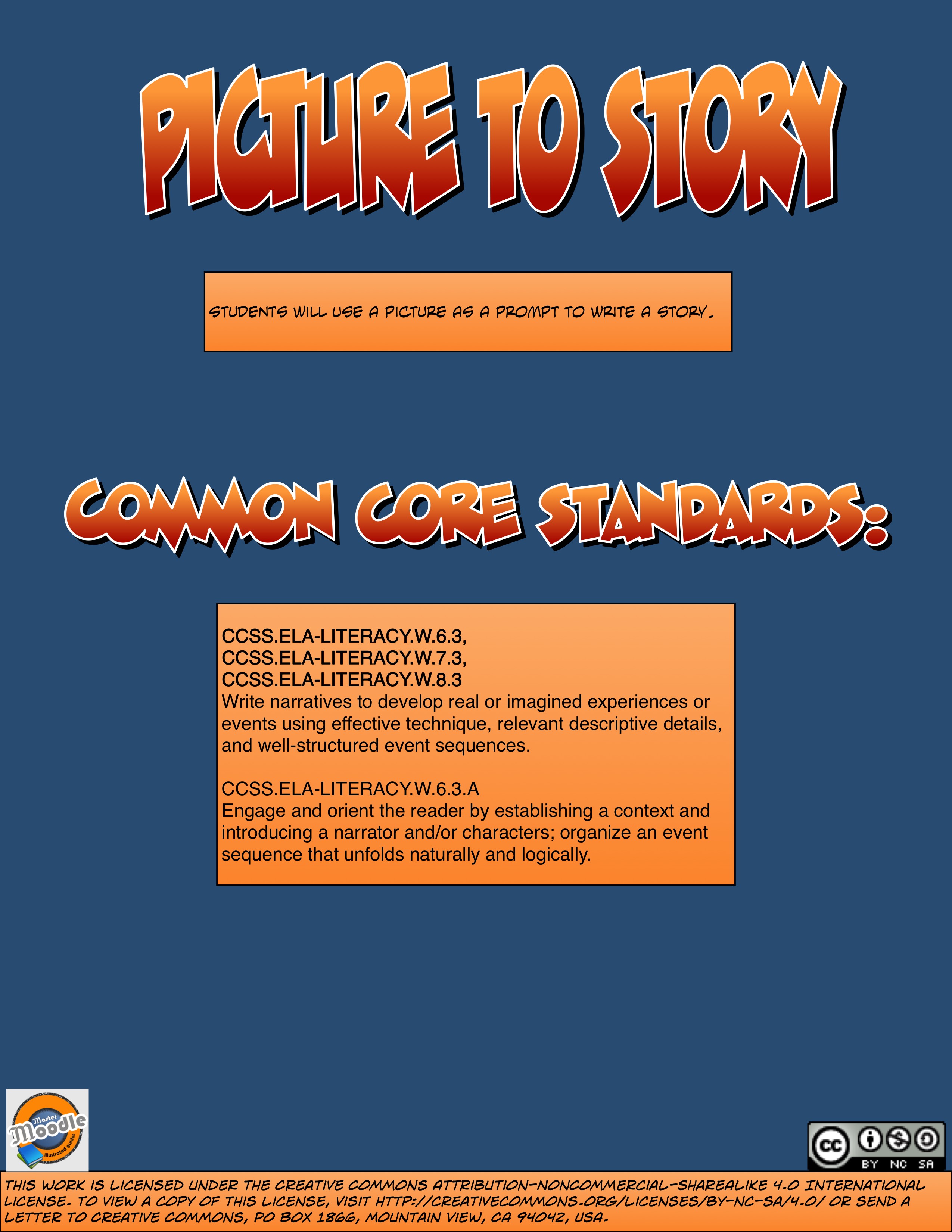
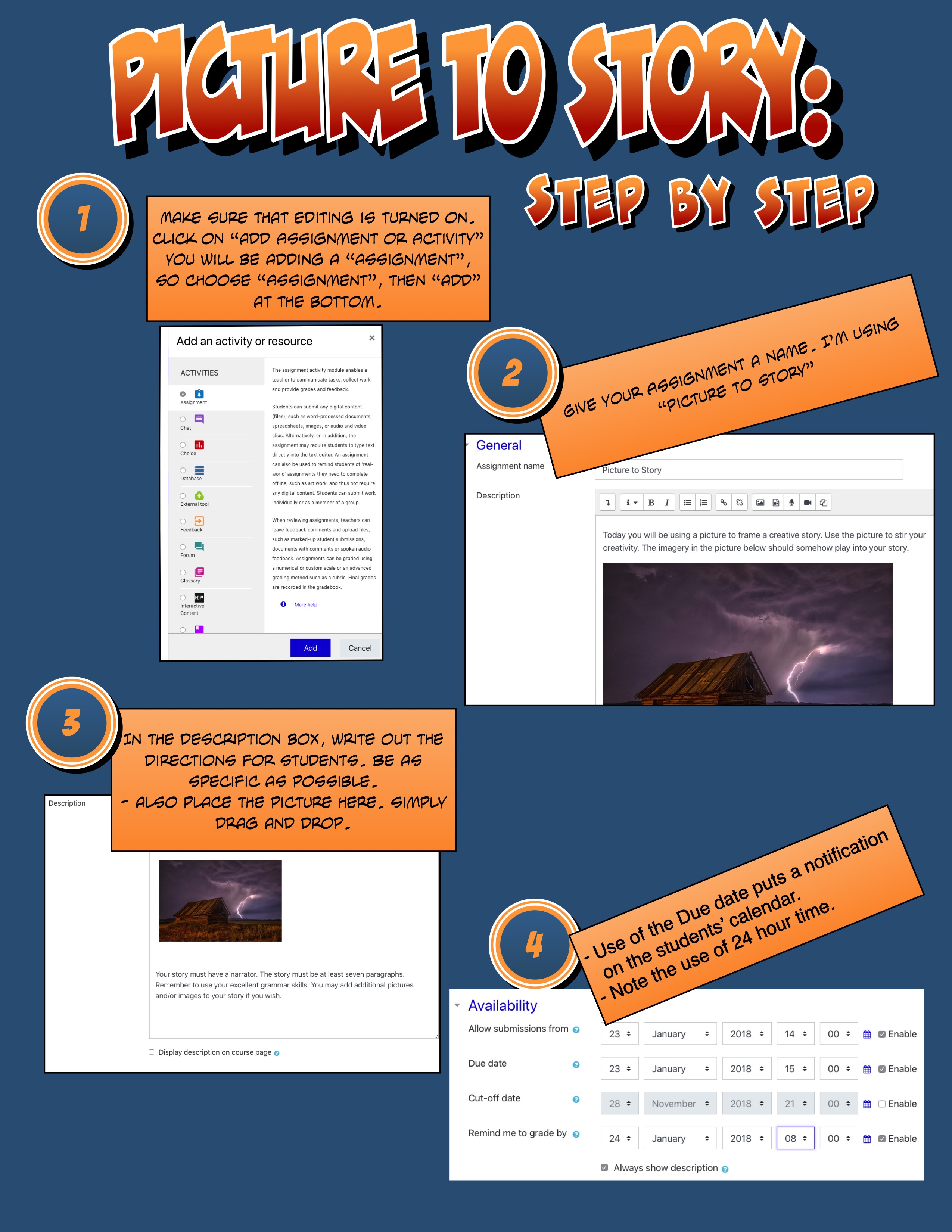
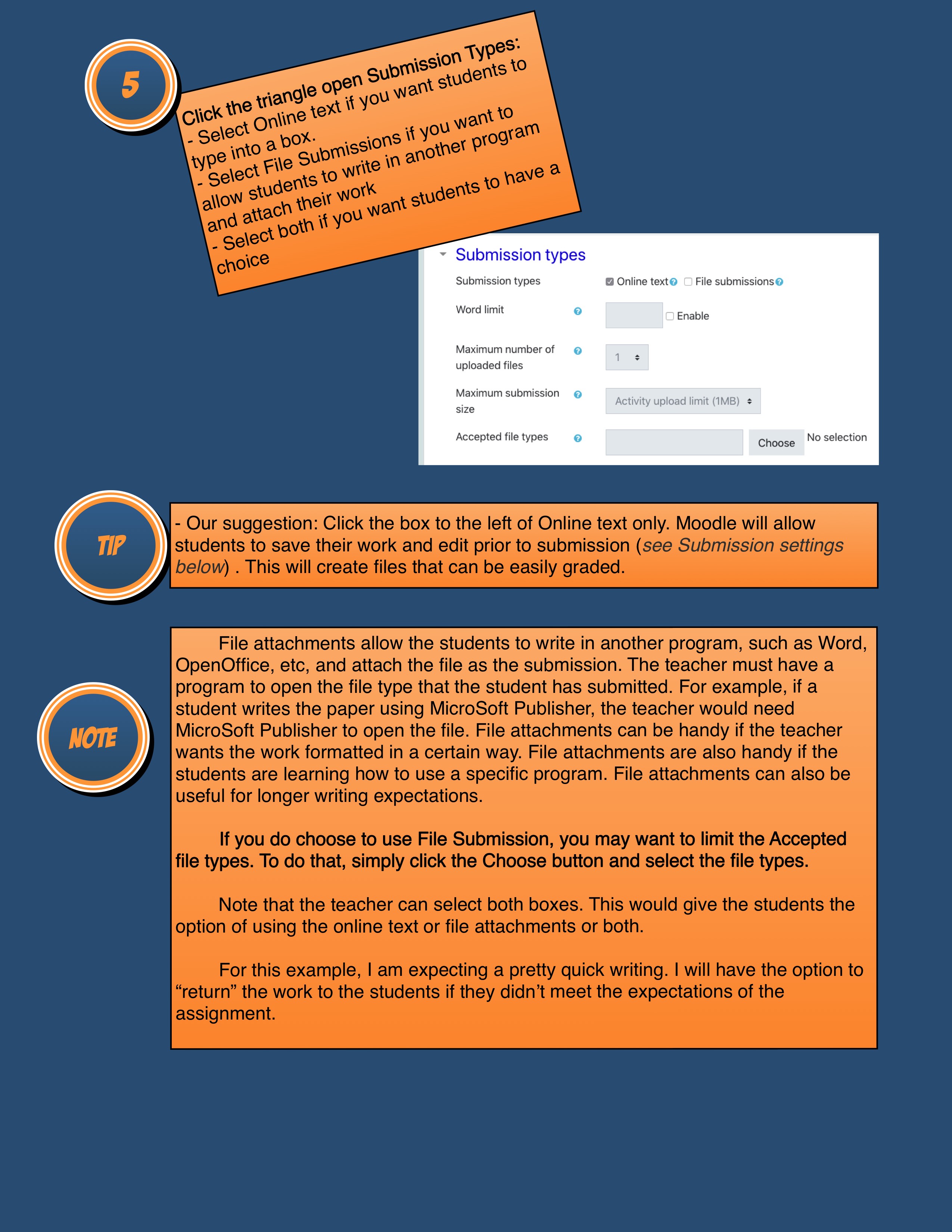
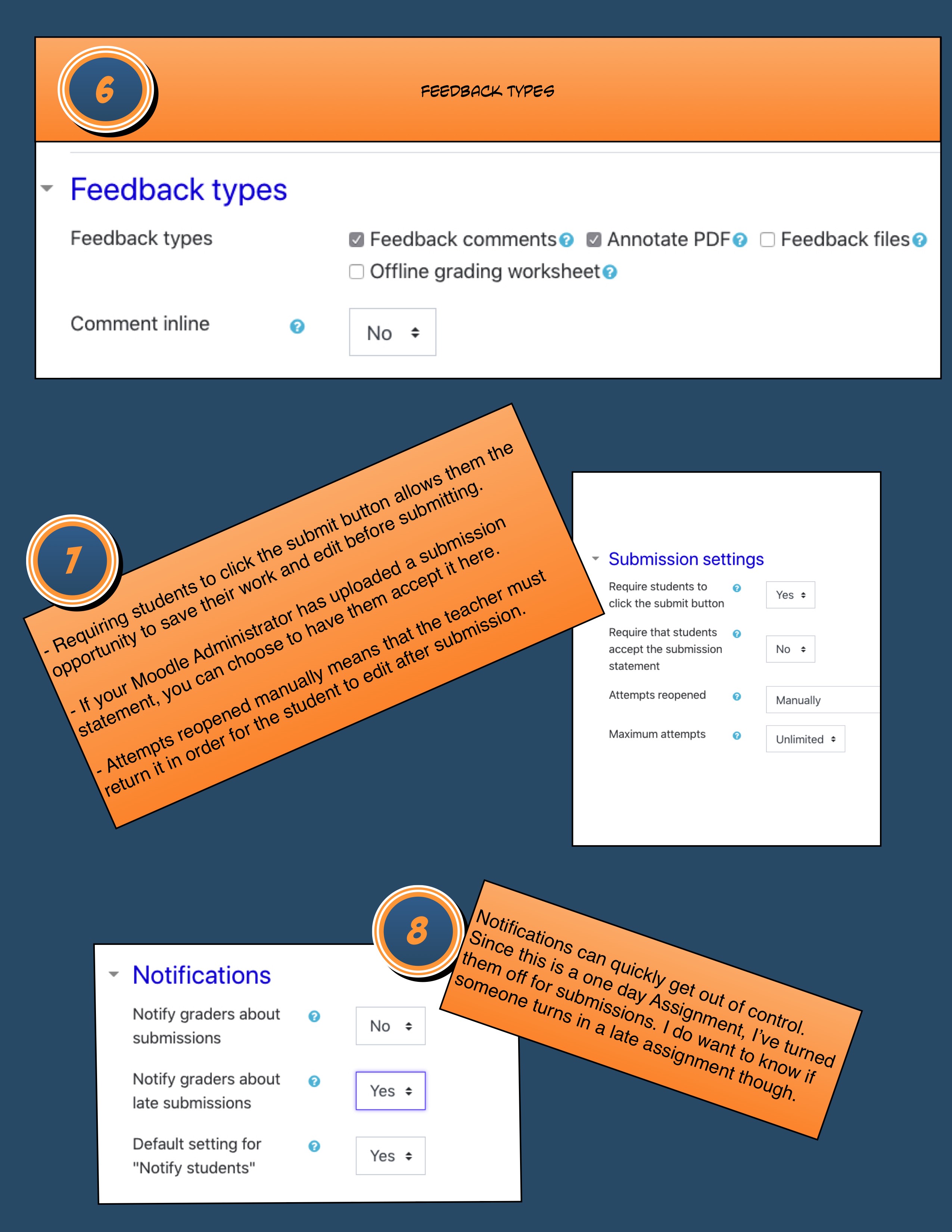
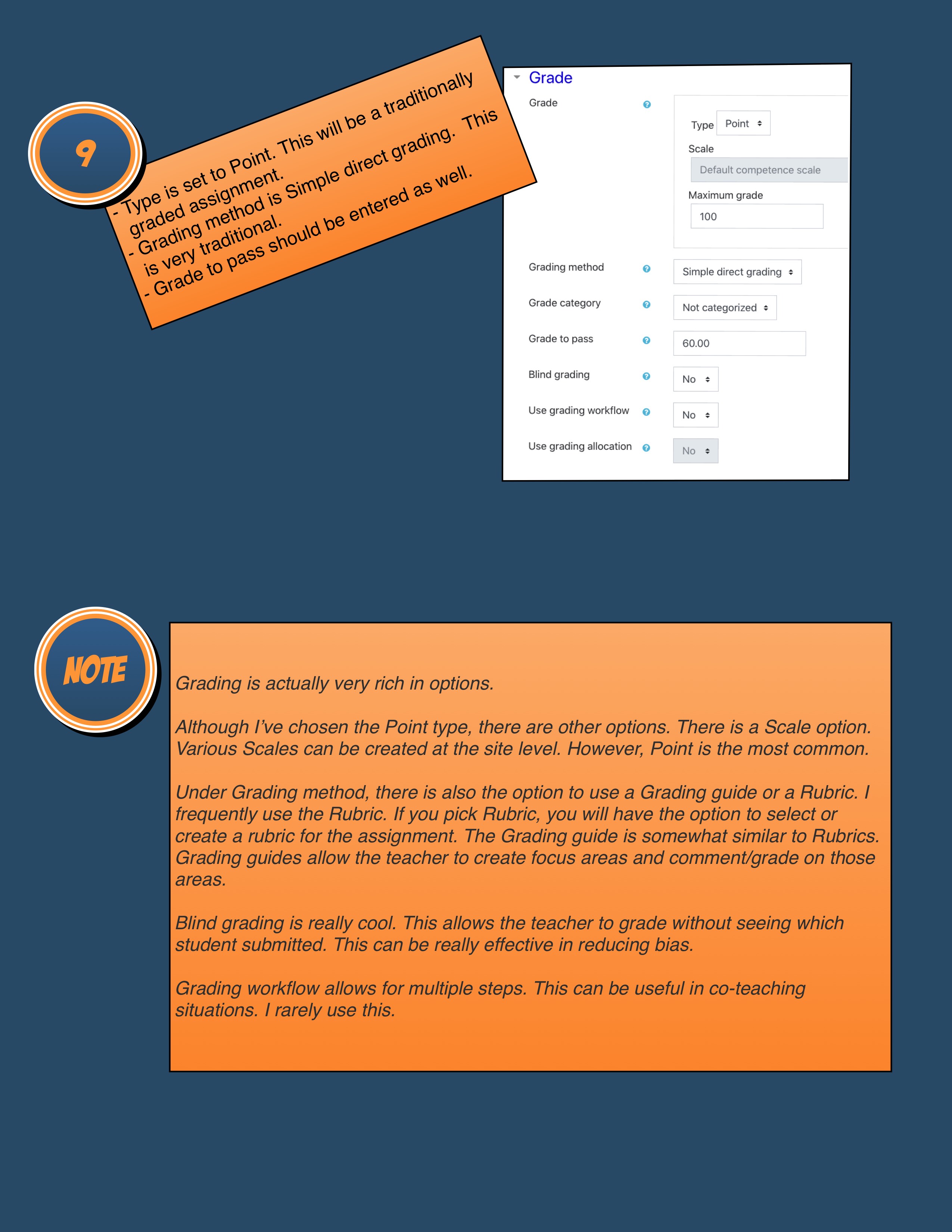
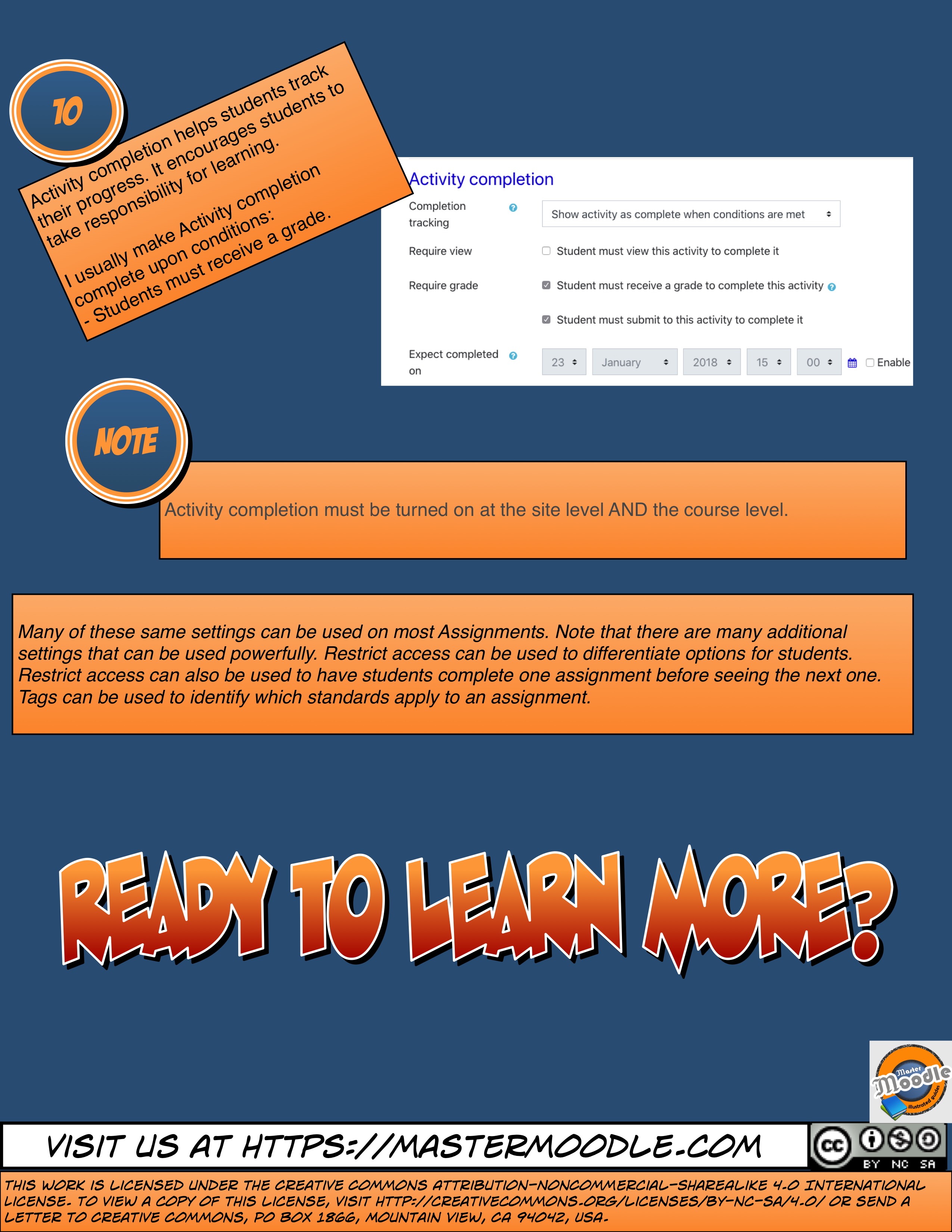
It’s time for Michigan to invest in the wonderful teachers, educators and support staff of Michigan public schools. One way to do this is to fully commit to supporting the implementation and development of open source throughout the state. Let the state be a leader to provide excellent resources to all of the districts.
Michigan has a goal of being a Top 10 in 10 state. Several of the touch strategic goals could be addressed or further assisted by the adoption of open source options.
The State has actually kind of begun the process. Michigan has committed to become an OER (Open Educational Resources) state. The Michigan OER site is now open. Michigan has started to develop some OER textbooks. This is a good start. But, there is so much more to do. We can go way deeper than materials.
First of all, Michigan needs to make educators aware of the power of OER. There also needs to be a real PR campaign to get teachers involved.
Michigan could do so much more to help the educational process. (This would end up impacting the kids, the very reason that we do the tough work that we do). If Michigan were to commit to using Open Source resources where it makes sense, so much good could be done. There could be so much collaboration around the state. There could be long term planning and work that is meaningful.
There are a couple of challenges faced by educators and districts across the state. One of those challenges is the “shiny object” challenge. As humans, we are generally attracted to “shiny objects”. In technology, this ends up being played out in terms of teachers and other educators chasing the new, heavily PR’d technology movement of the day. This is not being critical of educators, rather this is an acknowledgement of the real world. However, our kids don’t need the latest shiny thing, they need real education.
Real education takes real work. Sorry, but there is no easy, substantive, game changing, student effective magic bullet out there. Real education is messy and hard. It takes work. Real work. Real education takes time, talent, effort and understanding.
Michigan could help by supporting open source software. Districts have many similar needs. By supporting the implementation and development of open source projects, Michigan could reduce friction, free up resources, and increase support across the state.
Michigan provides some terrific support for teachers to continue learning through EduPaths. EduPaths is built on a commercial provider’s system. This is a commercial provider who has never actually made a profit*. They are somewhat famous for offering a great three year deal on their product. After the three years, the cost skyrockets. This leads many educational institutions to drop that provider and move to something else. Thus, this leads to investing in someone else instead of investing in ourselves.
Rather, I would like to see Michigan take a longer view and invest. Invest in the kids. Invest in the teachers. Invest in the Technology Directors.
So what are those investments in open source resources? Well, let’s start with a few suggestions.
- WordPress. Every district in Michigan needs to meet ADA requirements for web sites. By implementing WordPress, Michigan could help create a network of support for districts.
- Moodle. This is a powerful LMS (Learning Management System) that has incredible power to fundamentally change (update) how teachers provide educational experiences for students.
- Mahara. Student portfolios. Put the students in charge of their own learning. These can be exported by the student for their own use.
- Joget. This provides powerful workflows. This could be used for approval processes that are online (saving time, money and effort) with full accountability.
There’s more open source out there for us to evaluate and discuss. The good news is that Michigan has a terrific organization that they could tap for help. MAEDS runs a great conference. Technology Directors from around the state get together to discuss challenges and solutions.
This is not my first time to challenge the State to invest in us instead of investing in others. I’ve written about this before. This time though, I’m challenging the State Board of Education.
* Instracture Financial Results – For the full year ending December 31, 2018, Instructure expects revenue of approximately $204.5 million to $209.5 million, as compared to previously stated guidance of $203.5 million to $209.5 million, non-GAAP net loss of ($32.0) million to ($30.0) million, up from ($32.3) million to ($30.3) million, and non-GAAP net loss per common share of ($0.94) to ($0.88), up from ($1.03) to ($0.97).
I’m back from the Moodle Moot US 2018. This was a wonderful and overwhelming experience.
On Monday morning, I knew that I was presenting, so I arrived early at registration. I always like to view the room that I’m presenting in before I actually present. So I asked where the room was. There seemed to be a bit of confusion (there was a lot going on with it being the first day of the conference and such), but I was given directions to the room. Up to the fourth floor I go. There were some conference helpers putting signs up. They provide some direction – follow the hallway and turn left. I follow a hallway that seems like a back passage (it was), to a very large room. Oh, this is where the keynote is. Large room. Stage. Moodlemoot in two foot tall letters on the stage. OK. Someone misunderstood. Back down I go. I ask again where the room that I’m presenting is. Pretty much the same directions. Back up I go. Upon arrival this time, someone is in the room who confirms, yes, this is where I will be presenting. Butterflies start kicking in.
I head back down for the presenter meeting. I’m informed that my session will be recorded. Butterflies start doing loopty loops. I’m also asked if there are any changes to the presentation. The presentation that was provided earlier in the week is already queued up. Providing a copy of the presentation is pretty much standard practice. Usually, these are posted for those attending the conference as resource material. That is what my past experience had been. I didn’t expect it to be the “live” resource. Fortunately, I had fully prepared. I had added some additional speaker notes, but the presentation itself was done. I was also asked if there were any copyrighted images in my presentation – because they are going to record this. I don’t use copyrighted images in my presentations, so I was all set there. My presentation was to be fifteen minutes. Then, there would be five minutes for questions and/or movement. Finally, they let us know that there was a timer in front of the monitor. The timer would count down so that we could stay on target (this will be important later).
On to the presentation. I present regularly. I have had the honor and privilege to present and speak in a wide variety of places. There were a couple of presentations before mine (including the opening keynote in the very same room). So, I had the opportunity to relax, collect my thoughts. Chris Kenniburg was also presenting in the same room, but before me. He did a great job.
I had my presentation on my iPad. (This was because I had added to my speaker notes). On my iPad, I also had a timer. Just before going up to speak, I switched back to just the presentation (the presentation without the timer was a bit larger and easier to read my speaker notes). Naturally, this tempted the fates. I was introduced and started speaking. I finished the introductory section and looked at the clock. Still stuck on 15:00 minutes. Great. I look at the time that is posted on the slides (there is just a clock, not a timer). I try to calculate how long I’ve been speaking. I’m trying to do this while focusing on my presentation and what I have to say.
I finish up the second section of my presentation. I’m still trying to calculate how much time is left. The timer is still on fifteen minutes. As I start the third and final section of my presentation, the timer suddenly changes. 4:58. So, my guess has just been a little bit off. I try to pick up the pace just a bit without seeming obvious about it. I managed to address all the topics that I wanted. I did go over the fifteen minutes slightly, but not by much. I answered a couple of questions.
All in all, this was a great experience. I look forward to presenting in similar situations again. Next time, I think that I’ll leave my timer running.
This morning was my MAEDS 2018 presentation. I presented “Creating Workflows with Open Source Software”. This presentation focused on creating workflows for the approval process.
As an example, I used the situation of a principal requesting an additional teacher. Traditionally, this has been done with paper. Recently, many people have moved to using Google Forms. While this is electronic and has some advantages over paper, it doesn’t solve the whole problem. Those problems include the original (in this case the principal), doesn’t know where the process is.
What I presented on today was using Joget. Joget is open source software that allows one to create a very easy to use system for end users. Although it isn’t quite as easy to create the workflows (you do need to have some basic understanding of programming), it is MUCH easier than other options that I’ve found. Joget is very visual based. To create workflows, you drag and drop elements.
The biggest issue is frequently defining exactly what the process is.
The group was a great group with good questions and suggestions. I will be following up the presentation with the suggestions that were brought forth.
Sharing is important. I was very pleased at the number and interest for my presentation.
Now back to the conference…
I’ll be attending the MAEDS (Michigan Association of Educational Data Systems) the fall, October 10th through 12th. This is usually a great conference. There is lots of good, practical information and discussions.
This year, I’ll be presenting. My presentation will be “Create Workflows Using Open Source Software”. This presentation will focus around creating a workflow (approval processes) using Joget.
Although certainly not as easy to create as a Google Form, Joget does allow one to create a form for users to complete. The real difference is what happens after that form is filled out. Joget will automatically advance the completed form to the right person to approve. If that person approves, it goes to the next person that needs to approve. If it is denied at any point, whomever originated the request is notified.
Let’s take a look at an example. Let’s say that a principal wants to add a new teacher to his/her staff. Let’s say that principal wants to use Title MCM funds to pay for the teacher. The principal would complete the form that has been created for adding staff. Then, the request would automatically go to the Title MCM coordinator for approval. If approved, the Director of Instructional Staff would be notified and able to approve. Once that Director approves, it could go to the Superintendent to approve. If the Superintendent denies the request, the principal would receive notice that the Superintendent has denied the request (actually, the principal receives notification all the through the process).
Joget will allow for full tracking of where everything is in the process. It also allows for historical records of knowing who was entered, approved, and denied.
There is a LOT of work to make this all work. Everyone has to agree on discrete steps and actions. All of that has to be programmed in Joget. The good news is that this is relatively easy to do. It is very graphical.
At the end of the day, Joget is a lot more work than Google Forms. However, Joget also is much more complete in providing an actual useful process.
There will be a lot to cover for my presentation. Wish me luck.

I’ve been listening to the wonderful Calling Bull (well, actually, they don’t use “bull” but the whole word), course. I’ve had it on in the background as I work. There is a part of me that thinks that this should be required for everyone. It is a great reminder of logical fallacy and the importance of thinking clearly.
What is Calling Bull? Well, let’s take a look.
Our learning objectives are straightforward. After taking the course, you should be able to:
• Remain vigilant for bull contaminating your information diet.
• Recognize said bull whenever and wherever you encounter it.
• Figure out for yourself precisely why a particular bit of bull is bull.
• Provide a statistician or fellow scientist with a technical explanation of why a claim is bull.
• Provide your crystals-and-homeopathy aunt or casually racist uncle with an accessible and persuasive explanation of why a claim is bull.We will be astonished if these skills do not turn out to be among the most useful and most broadly applicable of those that you acquire during the course of your college education.
Now, the structure of the course is a pretty traditional college lecture class. I would love to see this reimagined as something a bit more entertaining. (To be clear, I’m enjoying the heck out of this just the way that it is. I just think that another delivery method would help with those less likely to seek out this kind of information).
The course features two presenters who do a good job of handing off the lecture back and forth. There are lots of good, realistic, relatable examples. They discuss why identifying and calling BS is so important and crucial.
I know a few people who regularly share BS stories “just in case it is true”. I’ve tried referring them to Snopes, but still they persist. These are good people who aren’t dumb. They just don’t realize how dangerous sharing some of these things are.
Please check out the wonderful Calling Bull site. It is good exercise for those thought muscles that we all need to exercise once in a while.
I’ve been ruminating about ISTE 2018. I’ve held off on posting this for a while. Now it’s time.
When I went to ISTE 2018 this year, I had a couple of goals. One goal was to look at Sketchnoting (which I’ve written about). Another goal that I had was to check out some of the Open Source opportunities that exist in education.
Now, I know that ISTE is a conference largely driven by the Sponsors and Vendors. We need sponsors and vendors in education. Districts can’t afford to only be open source. Many districts don’t have the technical background to implement very much open source at all. That is something that I was hoping that ISTE 2018 would be able to help address.
Keep in mind the Vision of ISTE:
Our Vision
ISTE’s vision is that all educators are empowered to harness technology to accelerate innovation in teaching and learning, and inspire learners to reach their greatest potential.
For me, empowering all educators involves open source options as well as the paid, proprietary ones.
Now I was able to attend one (yes, one) session that was an open source session. The session was quite good with lots of resources. However, I would like to see more. Much more.
A Proposal

I would like to see a track or least notation of open source presentations. I little bit of support and acknowledgement could go a long way. There are some open source alternatives that could help empower all educators and students.
This would not be the end of the Sponsors and Vendors. They would still have a role. They would probably have an even bigger role. Vendors could tout how much better and easier to use their product is. They could solve issues and provide opportunities that open source just wouldn’t.
There is currently a push to incorporate OER (Open Education Resources) into curriculum. This has taken a long time. It still has a long way to go. But, at least that push has started.
ISTE has a lot of educational leaders attending. (This is always interesting to me. I always expect more teachers to be in attendance. There seem to be a lot of Technology Directors/Coordinators and Technology Coaches in attendance). These groups should be leading the way for knowing our options. Not just the “shiny” ones, but all of them.
I would like to throw down the gauntlet to the wonderful ISTE leaders to use their influence and power to make open source truly part of the educational process. This will truly help EMPOWER all educators.
ISTE 2018 is now in the books. I’ve had some time to process the information and the experience.
ISTE is always overwhelming. There is a lot going on. There are thousands and thousands of people. (I know that they said they had the highest attendance ever, but I never heard how many). According to what I heard, there were over 18,000 people.
I didn’t feel as though I saw everything. There are poster sessions, presentations, and meetings that I would’ve liked to see but missed. This has always been the case. There is simply too much going on.
However, I always have a perspective of what I want to get out of the conference. For me, this year was about not getting caught up in the “shiny things”, but trying to focus on substantive topics, ideas and learning. I still believe that we get way too caught up in focusing on shiny things.
Observation 1
MicroSoft really, really, really wants back in on education. Chromebooks have eaten their lunch. MicroSoft took some really specific actions. They bought Flipgrid and made it “free” (there is an event set for August 1st which should provide more information (i.e. will an account be necessary? will students need an Office 365 account to use it?). Secondly, MicroSoft had a really big area in the vendor showroom. MicroSoft also has released a small tablet (the MicroSoft Surface Go), for the education market.
MicroSoft also had vending machines that gave out some swag provided that you tweeted with a given hashtag.
Observation 2
There were a great many more people creating Sketchnotes than I’ve ever seen. Sketchnotes are graphical notes. I went to a couple of sessions at a previous ISTE to learn about Sketchnotes. I also went to a couple of sessions specifically to learn and practice how to do Sketchnoting. However, even at sessions that had absolutely nothing to do with Sketchnoting, there were several people taking notes via Sketchnoting.
I’m still processing how this plays out in classrooms. I think that for many students, this could be a wonderful tool/strategy. It is clearly not a silver bullet that will fix everything, but the brain research seems pretty solidly behind this. Creating graphical notes seems to help the brain truly remember and understand the material. Which tools and how remains to be seen. iPads seem to have an advantage over Chromebooks for this task. However, iPads in schools come with many other issues.
Did you go to ISTE2018? What are your observations?






